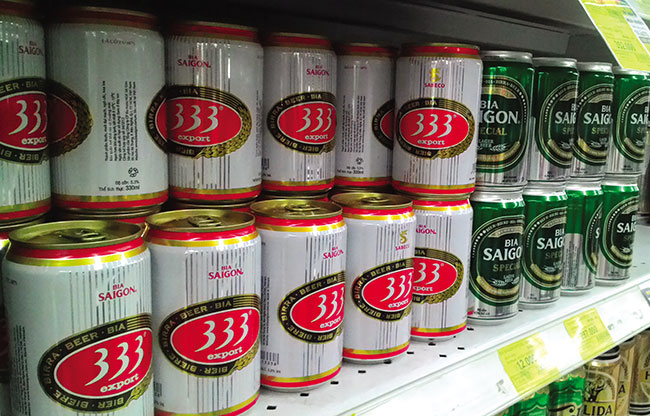Local brewer disputes hefty bill for tax arrears

The State Audit Office may end up “killing the golden goose” by bleeding Sabeco dry for taxes Photo: Le Toan
Last week, the State Audit Office of Vietnam (SAV) submitted documents to the Ministry of Finance proposing the collection of VND408 billion ($18.7 million) from the domestic brewer (Sabeco) as special consumption tax arrears for 2013.
According to the auditing report, Sabeco’s tax fraudulence was the result of distributing products through its subsidiaries – Sabeco Trading Company and its 10 regional distributors where Sabeco holds from 90-94 per cent of shares.
The agency has used the sale price of the regional distributors (the retail price) as the price for tax purposes rather than the price at which Sabeco sold the products to Sabeco Trading Company (the wholesale price), which the corporation dutifully recorded in its tax declarations.
By using the retail price as its basis for calculations, SAV has come up with the weighty tax bill much to the chagrin of the Sabeco management. In his response, Sabeco chairman Phan Dang Tuat told VIR that the basis for the tax bill from SAV was far from convincing.
Currently, Circular No. 05/2012/TT-BTC detailing a number of articles of the law on excise tax regulates that when the excise tax-liable goods producer sells goods via traders, the price used for tax calculation must not be lower than 10 per cent of the average selling price applied by those traders. The circular, dated January 5, 2012, has not yet specified the relationship between the producer and traders.
In this respect, “Sabeco has been paying tax in accordance with all legal instructions,” said Tuat.
According to lawyer Truong Thanh Duc – chair of BASICO Law Firm, the legal documents “have not yet regulated a precise measure to calculate excise tax liability. When law is still uncompleted, companies must not be forced to shoulder the whole blame.”
Furthermore, Sabeco argued in the document sent to authorised agencies that the aforementioned regional distributors were joint-ventures, which are independent legal entities themselves and not parts of the company’s organisational structure.
Economic expert Le Dang Doanh – former head of the Central Institute for Economic Management said: “It is unfair asking them to pay tax based on a price that they do not sell their products at. Sabeco is a goods producer – that’s why it needs the distributing system to sell its products.”
Currently, a series of producers are operating similar distribution systems as Sabeco’s, including Hanoi Beer Alcohol and Beverage JSC (Habeco) and Vietnam Brewery Ltd (VBL)
Also, Tuat warned that using the selling price at retail level can cause a “double tax” situation, with value added tax applied, which will harm both Sabeco and local consumers.
Lawyer Nguyen Thanh Vinh, partner of Baker & McKenzie Vietnam, told VIR, “Excise tax is supposed to target production, not distribution or consumption.”
“If Sabeco loses its competitiveness in the local market, the beverage industry here will soon become dominated by foreign competitors,” said Tuat.
Sabeco is an 89 per cent state-owned corporation that contributes a sizeable sum to the state coffers every year. “Last year, we contributed VND13.5 trillion ($618.8 million) to the state budget,” noted Tuat.
According to the company’s consolidated financial reports, Sabeco paid VND971.5 billion ($45.1 million) in 2014, and VND1.14 trillion ($53.14 million) in 2013 in terms of tax liability.
What the stars mean:
★ Poor ★ ★ Promising ★★★ Good ★★★★ Very good ★★★★★ Exceptional
Latest News
More News
- State corporations poised to drive 2026 growth (February 03, 2026 | 13:58)
- Why high-tech talent will define Vietnam’s growth (February 02, 2026 | 10:47)
- FMCG resilience amid varying storms (February 02, 2026 | 10:00)
- Customs reforms strengthen business confidence, support trade growth (February 01, 2026 | 08:20)
- Vietnam and US to launch sixth trade negotiation round (January 30, 2026 | 15:19)
- Digital publishing emerges as key growth driver in Vietnam (January 30, 2026 | 10:59)
- EVN signs key contract for Tri An hydropower expansion (January 30, 2026 | 10:57)
- Vietnam to lead trade growth in ASEAN (January 29, 2026 | 15:08)
- Carlsberg Vietnam delivers Lunar New Year support in central region (January 28, 2026 | 17:19)
- TikTok penalised $35,000 in Vietnam for consumer protection violations (January 28, 2026 | 17:15)
















 Mobile Version
Mobile Version